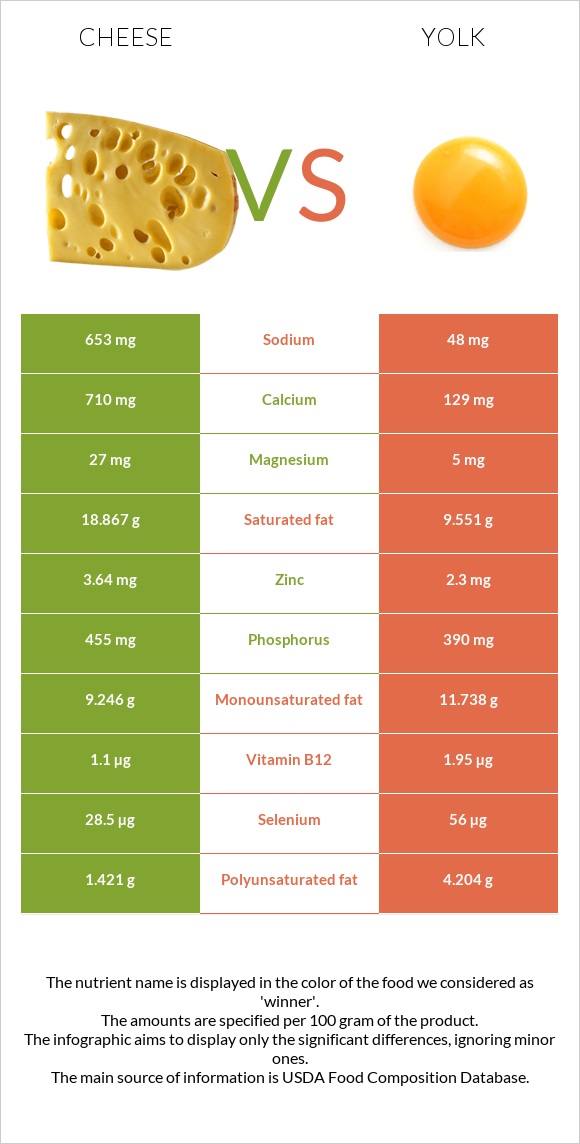Cheese vs. Yolk — In-Depth Nutrition Comparison
Compare
The main differences between cheese and yolk
- Cheese is richer in calcium, yet yolk is richer in choline, vitamin B5, selenium, vitamin B12, iron, vitamin D, and folate.
- Daily need coverage for cholesterol for yolk is 329% higher.
- Cheese contains 6 times more calcium than yolk. Cheese contains 710mg of calcium, while yolk contains 129mg.
- Yolk contains less saturated fat.
Food types used in this article are Cheese, cheddar and Egg, yolk, raw, fresh.
Infographic

Infographic link
Mineral Comparison
Mineral comparison score is based on the number of minerals by which one or the other food is richer. The "coverage" charts below show how much of the daily needs can be covered by 300 grams of the food.
| Contains more MagnesiumMagnesium | +440% |
| Contains more CalciumCalcium | +450.4% |
| Contains more ZincZinc | +58.3% |
| Contains more PhosphorusPhosphorus | +16.7% |
| Contains more PotassiumPotassium | +43.4% |
| Contains more IronIron | +1850% |
| Contains more CopperCopper | +156.7% |
| Contains less SodiumSodium | -92.6% |
| Contains more ManganeseManganese | +103.7% |
| Contains more SeleniumSelenium | +96.5% |
Vitamin Comparison
Vitamin comparison score is based on the number of vitamins by which one or the other food is richer. The "coverage" charts below show how much of the daily needs can be covered by 300 grams of the food.
| Contains more Vitamin B3Vitamin B3 | +145.8% |
| Contains more Vitamin KVitamin K | +242.9% |
| Contains more Vitamin AVitamin A | +15.5% |
| Contains more Vitamin EVitamin E | +263.4% |
| Contains more Vitamin DVitamin D | +800% |
| Contains more Vitamin B1Vitamin B1 | +506.9% |
| Contains more Vitamin B2Vitamin B2 | +23.4% |
| Contains more Vitamin B5Vitamin B5 | +629.3% |
| Contains more Vitamin B6Vitamin B6 | +430.3% |
| Contains more Vitamin B12Vitamin B12 | +77.3% |
| Contains more FolateFolate | +440.7% |
All nutrients comparison - raw data values
| Nutrient |  |
 |
DV% diff. |
| Cholesterol | 99mg | 1085mg | 329% |
| Choline | 16.5mg | 820.2mg | 146% |
| Calcium | 710mg | 129mg | 58% |
| Vitamin B5 | 0.41mg | 2.99mg | 52% |
| Selenium | 28.5µg | 56µg | 50% |
| Saturated fat | 18.867g | 9.551g | 42% |
| Vitamin B12 | 1.1µg | 1.95µg | 35% |
| Iron | 0.14mg | 2.73mg | 32% |
| Folate | 27µg | 146µg | 30% |
| Sodium | 653mg | 48mg | 26% |
| Vitamin D | 24 IU | 218 IU | 24% |
| Vitamin D | 0.6µg | 5.4µg | 24% |
| Vitamin B6 | 0.066mg | 0.35mg | 22% |
| Polyunsaturated fat | 1.421g | 4.204g | 19% |
| Protein | 22.87g | 15.86g | 14% |
| Zinc | 3.64mg | 2.3mg | 12% |
| Vitamin E | 0.71mg | 2.58mg | 12% |
| Vitamin B1 | 0.029mg | 0.176mg | 12% |
| Fats | 33.31g | 26.54g | 10% |
| Phosphorus | 455mg | 390mg | 9% |
| Vitamin B2 | 0.428mg | 0.528mg | 8% |
| Vitamin A | 330µg | 381µg | 6% |
| Monounsaturated fat | 9.246g | 11.738g | 6% |
| Magnesium | 27mg | 5mg | 5% |
| Copper | 0.03mg | 0.077mg | 5% |
| Calories | 404kcal | 322kcal | 4% |
| Potassium | 76mg | 109mg | 1% |
| Manganese | 0.027mg | 0.055mg | 1% |
| Vitamin K | 2.4µg | 0.7µg | 1% |
| Net carbs | 3.09g | 3.59g | N/A |
| Carbs | 3.09g | 3.59g | 0% |
| Sugar | 0.48g | 0.56g | N/A |
| Vitamin B3 | 0.059mg | 0.024mg | 0% |
| Trans fat | 0.917g | N/A | |
| Tryptophan | 0.547mg | 0.177mg | 0% |
| Threonine | 1.044mg | 0.687mg | 0% |
| Isoleucine | 1.206mg | 0.866mg | 0% |
| Leucine | 1.939mg | 1.399mg | 0% |
| Lysine | 1.025mg | 1.217mg | 0% |
| Methionine | 0.547mg | 0.378mg | 0% |
| Phenylalanine | 1.074mg | 0.681mg | 0% |
| Valine | 1.404mg | 0.949mg | 0% |
| Histidine | 0.547mg | 0.416mg | 0% |
| Fructose | 0g | 0.07g | 0% |
| Omega-3 - EPA | 0.01g | 0.011g | N/A |
| Omega-3 - DHA | 0.001g | 0.114g | N/A |
| Omega-3 - DPA | 0.017g | 0g | N/A |
| Omega-6 - Eicosadienoic acid | 0.007g | N/A |
Macronutrient Comparison
Macronutrient breakdown side-by-side comparison
| Contains more ProteinProtein | +44.2% |
| Contains more FatsFats | +25.5% |
| Contains more OtherOther | +118.2% |
| Contains more CarbsCarbs | +16.2% |
| Contains more WaterWater | +41.3% |
Fat Type Comparison
Fat type breakdown side-by-side comparison
| Contains less Sat. FatSaturated fat | -49.4% |
| Contains more Mono. FatMonounsaturated fat | +27% |
| Contains more Poly. FatPolyunsaturated fat | +195.8% |
Carbohydrate type comparison
Carbohydrate type breakdown side-by-side comparison
| Contains more GlucoseGlucose | +44.4% |
| Contains more LactoseLactose | +71.4% |
| Contains more GalactoseGalactose | +42.9% |
| Contains more SucroseSucrose | +∞% |
| Contains more FructoseFructose | +∞% |
| Contains more MaltoseMaltose | +∞% |
~equal in
Starch
~0g





